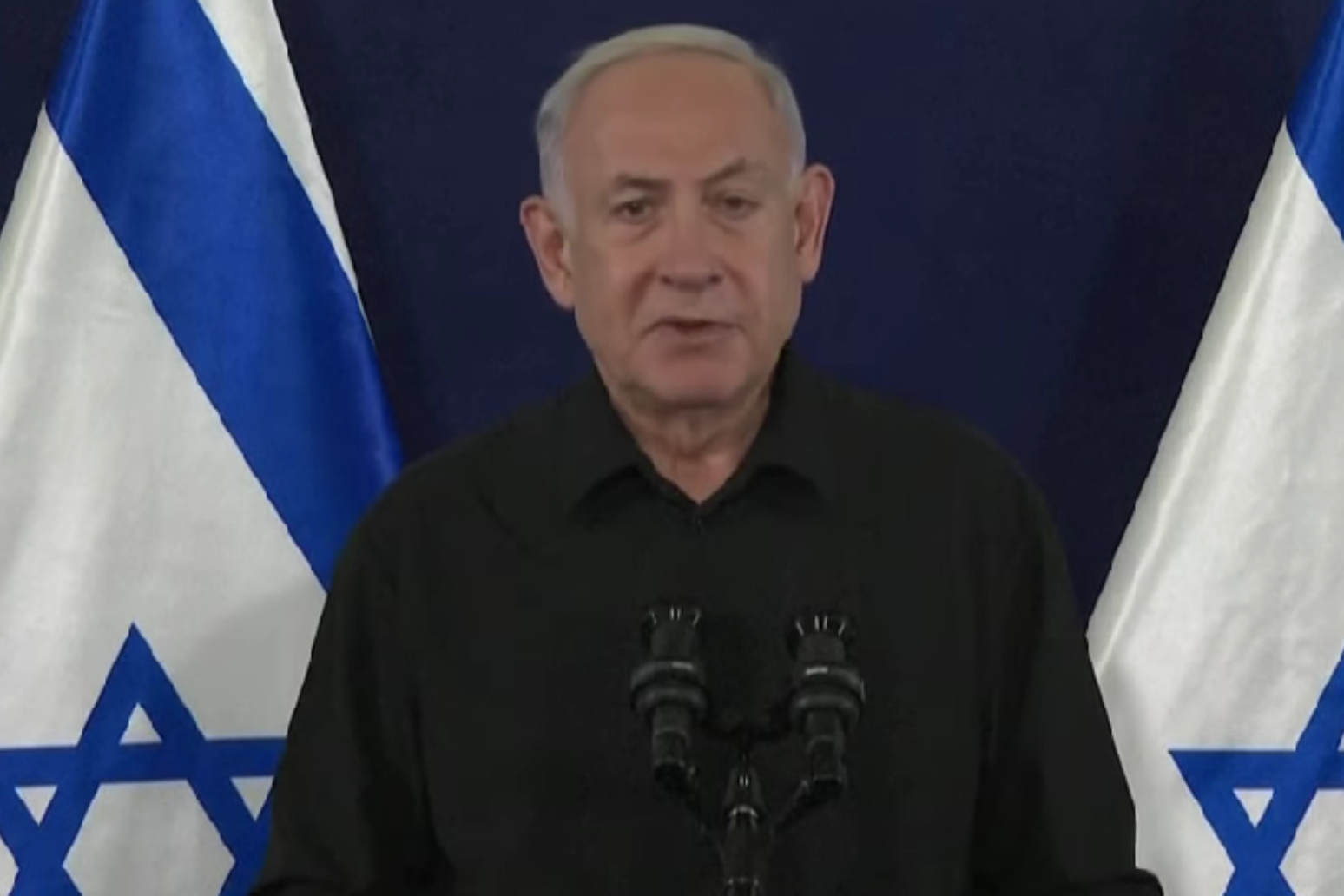
Israeli Prime Minister Benjamin Netanyahu has told his nation that the military has opened a “second stage” in the war against Hamas by sending ground forces into Gaza and expanding attacks from the ground, air and sea.
He said these will only increase ahead of a broad ground invasion into the territory.
Mr Netanyahu added: “It will be long and difficult. We are ready.”
An Israeli bombardment, described by Gaza residents as the most intense of the war, has knocked out most communications in the territory.
This largely cut off the besieged enclave’s 2.3 million people from the world, while enabling the Israeli military to control the narrative in the new stage of fighting.
The military released grainy images on Saturday showing tank columns moving slowly in open areas of Gaza, many apparently near the border, and said war planes had bombed dozens of Hamas tunnels and underground bunkers.
The underground sites are a key target in Israel’s campaign to crush the territory’s ruling group after its bloody incursion into Israel three weeks ago.
The escalation brought more domestic pressure on Israel’s government to bring about the release of dozens of hostages seized in the October 7 Hamas attack, amid concerns they were being held underground.
Desperate family members met Mr Netanyahu on Saturday and expressed support for an exchange for Palestinian prisoners held in Israel, a swap floated by the top Hamas leader in Gaza.
Mr Netanyahu told the nationally televised news conference that Israel is determined to bring back all the hostages, and maintained that the expanding ground operation “will help us in this mission”.
He said he could not reveal everything that is being done due to the sensitivity and secrecy of the efforts.
“This is the second stage of the war, whose objectives are clear: to destroy the military and governmental capabilities of Hamas and bring the hostages home,” he said in his first time taking questions from journalists since the war began.
He did not address calls for a ceasefire.
Mr Netanyahu acknowledged that the October 7 “debacle”, in which more than 1,400 people were killed after the Hamas attack, would need a thorough investigation, adding that “everyone will have to answer questions, including me”.
The Israeli military said it was gradually expanding its ground operations inside Gaza, while stopping short of calling it an all-out invasion.
“We are proceeding with the stages of the war according to an organised plan,” said the chief military spokesman, Rear Admiral Daniel Hagari. The comments hinted at a strategy of a staged escalation, instead of a massive and overwhelming offensive.
Early in the war, Israel amassed hundreds of thousands of troops along the border. Until now, troops had conducted brief nightly ground incursions before returning to Israel.
Palestinian militants have fired thousands of rockets into Israel over the past three weeks.
The Palestinian death toll in Gaza on Saturday rose to just over 7,700 people since the war began, with 377 deaths reported since late on Friday, according to the Gaza health ministry. A majority of those killed have been women and minors, the ministry said.
Spokesman Ashraf al-Qidra told reporters that the disruption of communications has “totally paralysed” the health network. Residents had no way of calling ambulances, and emergency teams are chasing the sounds of artillery barrages and air strikes.
An estimated 1,700 people remain trapped beneath the rubble, according to the health ministry, which has said it bases its estimates on distress calls it has received.
Some civilians were using their bare hands to pull injured people from the rubble and loading them into personal cars or donkey carts.
Israel says its strikes target Hamas fighters and infrastructure and that the militants operate among civilians, putting them in danger.
Meanwhile, the World Health Organisation appealed to “the humanity in all those who have the power to do so to end the fighting now” in Gaza.
It said in a statement: “There are more wounded every hour. But ambulances cannot reach them in the communications blackout. Morgues are full. More than half of the dead are women and children.”
Palestinians say the war is also robbing them of the funeral rites that could have offered mourners some dignity and closure. Overcrowded cemeteries have compelled families to dig up long-buried bodies and deepen the holes.
More than 1.4 million people across Gaza have fled their homes, nearly half crowding into UN schools and shelters, following repeated warnings by the Israeli military that they would be in grave danger if they remained in northern Gaza.
A large number of residents have not evacuated to the south, in part because Israel has also bombarded targets in so-called safe zones where conditions are increasingly dire. Food and water supplies were running out. Israel knocked out electricity early in the war.
Humanitarian workers say the trickle of aid Israel has allowed to enter from Egypt in the past week is a tiny fraction of what is needed. Gaza hospitals have been scrounging for fuel to run emergency generators that power incubators and other life-saving equipment.
The UN agency for Palestinian refugees, which runs a network of shelters and schools for nearly half the displaced Gaza residents, has lost contact with most of its staff, spokeswoman Juliette Touma said, and coordinating aid efforts was now “extremely challenging”.
The intensified air and ground campaign raised new concerns about hostages dragged into Gaza. On Saturday, hundreds of relatives gathered in Tel Aviv and demanded that the government put the return of their loved ones ahead of Israel’s military objectives.
In comments likely to inflame these tensions, Hamas’ top leader in Gaza, Yehiyeh Sinwar, said the Palestinian militant group is ready to release all hostages immediately if Israel frees all Palestinians held in Israeli prisons.
Rear Adm Hagari, the Israeli military spokesman, dismissed the offer of an exchange as “psychological terror”.
In Cairo, Egyptian President Abdel Fattah el-Sissi said his government is working to de-escalate the conflict through its talks with the warring parties to release prisoners and hostages. On Saturday, he spoke with UN secretary-general Antonio Guterres.
Mr Guterres said in a statement he was “surprised by an unprecedented escalation of the bombardments and their devastating impacts” in Gaza.
The overall number of deaths in Gaza and Israel far exceeds the combined toll of all four previous Israel-Hamas wars, estimated at around 4,000.
The conflict has threatened to ignite a wider war across the region, with senior figures in Arab nations expressing increasing alarm over a potential ground invasion in Gaza by Israel.
Published: by Radio NewsHub










